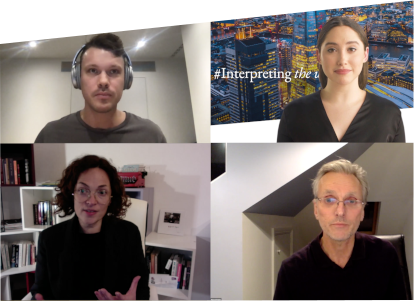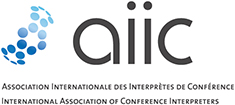Web - News - UK-IE

AIIC UK & Ireland News

The second webinar in AIIC UK & Ireland’s series of webinars on Artificial Intelligence and the Interpreter , "It's a Kind of Magic? Artificial Intelligence and Human Insight", sought to place the automated speech translation solutions that we had learnt about in the first webinar in a broader context. Philosophical questions such as the importance of understanding what you’re saying were complemented by a consideration of the practical challenges involved in making robots acceptable as carers, companions, or … interpreters. And we saw some astonishing AI magic in the form of multilingual videos spoken by realistic avatars, including a video created especially for our event .
Once again we were delighted to have attracted as many as 700 registrants, over half of whom were AIIC members. Since one of the objectives of our webinars is to reach out beyond the Association, we were also pleased to welcome a significant number of interpreters who are not yet members of AIIC, as well as other professional linguists, scientists and tech enthusiasts.
Monika Kokoszycka, our regional Chair, began the event by introducing the speakers and referring to the Turing test, or “imitation game”, a well-known way of determining a machine’s ability to exhibit intelligent behaviour indistinguishable from that of a human by imitating human responses. This proved to be a leitmotif of the webinar.
In his address, science writer Dr Marek Kohn argued that however good computers become at playing Alan Turing’s "imitation game", human interpreters will always beat them at the interpretation game – because unlike the machines, the humans will understand what they are saying (see Marek's full text). When in the future clients have a choice to make between AI and human interpreters, Kohn considers that there would be circumstances when AI interpreters might be preferred: if the content was particularly sensitive or confidential, for example. However, human interpreters, he argues, will always have the edge when it came to social skills, etiquette, cultural understanding, empathy and intuition.
Professor Agnieszka Wykowska, Head of the Social Cognition in Human-Robot Interaction lab at the Istituto Italiano di Tecnologia, then introduced us to iCub, a robot resembling a human, which (who?) has become something of a celebrity in Italy. Agnieszka presented her work investigating when and under which conditions people treat robots as intentional beings. She revealed that some people are more willing to do so than others, and that it is possible to investigate their brain activity to understand why that is the case.
The webinar’s final speaker was Victor Riparbelli, the CEO and co-founder of Synthesia, a UK software company which harnesses the power of AI for content creation tools, especially multilingual videos. He showed how avatars of real actors are created, which then speak content in several different languages. The result was convincing and quite literally breath-taking.
The implications of these new technologies prompted many interesting questions, which our speakers were kind enough to answer during the Q&A session, and the event concluded with a recognition that AI is now more advanced that even Alan Turing could have imagined.
Monika Kokoszycka and the entire AIIC UK & Ireland organising team - Françoise Comte, Louise Jarvis, Stefanie MacDonald, Deborah Muylle and Monica Robiglio – would like to thank the three speakers for giving up their time to share their insights with us.
We hope you will join us for the next instalments of the webinar series on 11 December, 8 January and 15 January, when we will continue our exploration of themes relating to AI and the Interpreter.
.

